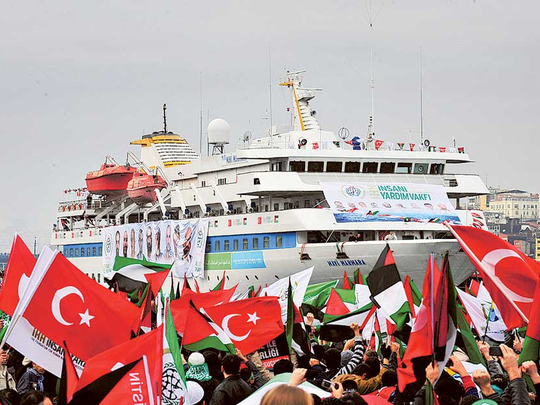
Dubai: Israel will continue its full naval blockade on Palestine even though Turkey agreed on Sunday to resume full diplomatic relations with Israel. The agreement marks an end to a bitter, six-year rift between the once-close regional allies, according to officials from both countries.
The Turkish government planned to make a parallel announcement in Ankara to coincide with one being made in Rome by Israeli Prime Minister Benjamin Netanyahu.
The two countries fell out after a deadly confrontation in 2010 when Israeli commandos stormed a flotilla of Turkish and international activists who tried to breach Israel’s illegal naval blockade of the Gaza Strip. The Mavi Marmara was part of the flotilla carrying aid to Gaza when commandos rappelled onto the ship’s deck and killed nine activists. A tenth activist later died of his wounds.
Negotiating teams for the two countries met in Rome over the weekend.
Reconciliation between the two states, both important allies of Washington, has long been a US interest as America confronts civil war in Syria and broader instability in the region.
Turkey was once Israel’s closest friend in the Muslim world, and the two countries still share many strategic interests, including containing Iran.
Turkey maintains close political ties with Hamas and, over the weekend, President Recep Tayyip Erdogan met with Khalid Mesha’al, the exiled political chief of Hamas, in Istanbul, according to the official Anadolu Agency, which quoted presidential sources.
An Israeli official in Rome said Erdogan had agreed to a document separate from the main accord that would instruct the relevant Turkish agencies to help resolve the issue of Israelis missing in Gaza.
Many of the terms of the deal between Israel and Turkey are similar to those announced in December, when officials said a preliminary understanding had been reached. Israel is to pay about $20 million (Dh73.6 million) into a compensation fund for the families of those killed on the Mavi Marmara. Turkey, in turn, is to drop criminal charges it had filed against Israeli officers.
Israel also expects the Turkish authorities to prevent Hamas operatives in Turkey from orchestrating attacks against Israel. According to the Turkish official, Turkey will be allowed to deliver humanitarian aid to Gaza and invest in infrastructure projects in Gaza and the West Bank.
Israel and Turkey will return ambassadors to each other’s capitals and will discuss building a pipeline to bring natural gas from Israel to Turkey.
This deal has “immense implications for the Israeli economy, and I use that word advisedly,” Netanyahu said in Rome.
Years of on-again, off-again rapprochement talks received new impetus after the Turkish military downed a Russian combat plane in November, provoking Russian economic sanctions that highlighted Turkey’s vulnerability to Moscow’s energy policies.
A senior Turkish official said his country will also be able to build major projects in the West Bank, including an industrial zone in Jenin.
Relations began to fray after Erdogan took power in Turkey in 2003 at the head of a government that drew nearer to Iran.
Turkey’s confrontation with Russia turned the tide. While diplomats negotiated, Turkish and Israeli gas companies have accelerated discussions in recent months as talks between the countries intensified, according to two people familiar with the matter.












